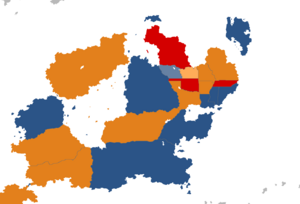Second Galian Cold War
| Cold War | |
|---|---|
| 21 June 1996 – Ongoing (28 years, 5 months, 4 weeks and 1 day) Part of the post-Great War III era | |
| |
 |
The Second Galian Cold War refers to the current political tension between the Galian Entente and Mutual Defense Pact, often referred to as simply "the Entente" and "the MDP". The term cold war is used to reflect the relative lack of large-scale fighting between the two factions. Despite this tenuous peace, both factions continue to support opposing sides in regional proxy wars and conflicts. The origins of the cold war are primarily ideological, with the Entente primarily consisting of democratic states while the MDP generally consists of authoritarian and monarchical states. The two sides compete in arms races, conventional military deployment, struggles for dominance via indirect means, propaganda campaigns, active espionage, economic sanctions, diplomacy, and technological competitions.
The Galian Entente consists of twelve powers, with four being located outside of Galia (the Antarctic Circle States, Zarare, Greater Niagara, and The Furbish Islands) and consists of an alliance of generally liberal democratic governments. The MDP consists of eight Galian powers and is generally made up of authoritarian regimes and command economies. Both sides frequently participate in the funding of or intervention in local civil wars, leading to near conflict on several occasions. Currently, the largest conflicts are the Dumatinan Conflict, the Temelaelian coup, and the Northern Galia Conflict. These conflicts have become proxies for direct conflict among the competing powers.
The Galian Cold War is generally considered to have three faces. The first phase, Opposition, saw the two factions intervene in many of the post-GWIII conflicts. After the end of these proxy conflicts, a period of detente followed between the MDP and Entente with tensions cooling and relations improving. However, the Kolmhark War, where Inglaterran troops invaded the Kolmhark Islands in 2014, is considered to have raised tensions and effectively neutralized any chances of a normalization of relations in the short term and is considered to have thrust the chance of war in Galia to their highest level in decades. The period since the Kolmhark War has been called "New Opposition", a term which indicates higher geopolitical and social tensions than in past decades.
The Galian Cold War is considered one of the most important conflicts in the world. Most of the major regional and international powers have played and are continuing to play roles in the conflict, and the threat of war in Galia is ever-present.





